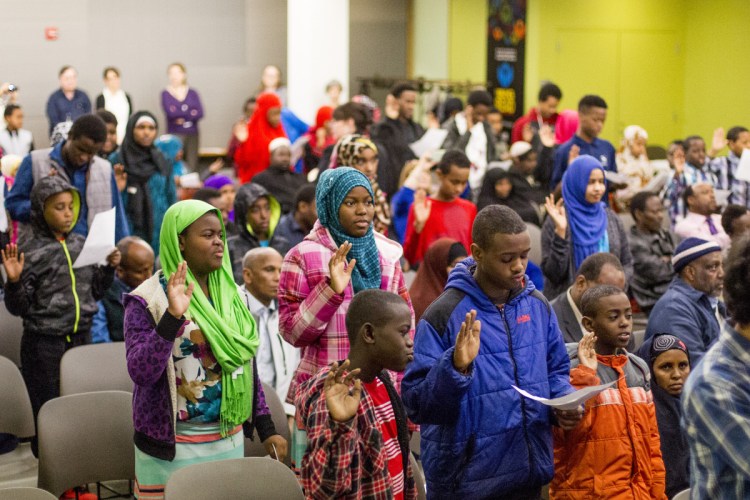Advocates in Maine remain concerned about U.S. immigration policy even after an executive order by President Donald Trump on Wednesday backtracked a policy of separating children from their families at the Mexico border.
The order from the president follows a public outcry over his administration’s treatment of immigrant children, and it promised to “maintain family unity.” But it also allows for the construction of detention facilities, if necessary, to hold families as they go through immigration proceedings, and seeks to override a law limiting the number of days children can stay in detention facilities.
“The administration created the problem of separating families, and now they’ve created a different problem of detaining families indefinitely,” said Julia Brown, an advocacy and outreach attorney for the Immigrant Legal Advocacy Project in Portland. “Children don’t belong in jail, regardless of whether they are with their families.”
About 3 percent of Maine’s population is immigrants, according to the American Immigration Council.
The leading countries of origin for immigration into Maine are Canada, the Philippines and England, according to the council, and in recent years Maine also has experienced a surge in African immigration, particularly from Somalia.
But Maine also has its share of immigrants who have entered the country through the U.S.-Mexico border, according to experts, who added that the recent situation on the border has broader implications for all immigrants.
“I don’t think the president deserves much credit for rescinding his own policy that was so cruel and inhumane,” said Chris Meyers Asch, executive director of the Capital Area New Mainers Project, an Augusta-based group that works with immigrants and refugees on adjusting to life in Central Maine. “I am relieved the policy has been rescinded and I hope it will never again be American policy to separate children from their families.”
Similarly, Mufalo Chitam, executive director of the Maine Immigrants’ Rights Coalition, said it was a “great move” to end the practice of separating families, but concerns remain.
“One of the things we know about the current administration is when we’re starting from a place of ‘zero tolerance,’ it doesn’t change anything in terms of how secure people will feel at any time,” Chitam said. “It’s hard to say, ‘This is behind us and tomorrow will be different.’ What we’ve been seeing based on the past is things are still uncertain.”
In April, the Trump administration implemented its “zero tolerance” policy seeking to prosecute as many illegal border crossings as possible, a move that has led to a sharp increase in the number of children separated from their parents at the border.
Chitam said the policy has contributed to fear among the country’s immigrant population, including asylum seekers and those who are here legally.
“Our immigrant community is seeing how the U.S. is treating people coming into the country who are fleeing violence,” said Brown, the immigration attorney. “We are locking them up and taking kids away from their parents. It’s increasing fear here to see our government doing that to immigrants.”
The policy is also another facet of a larger strategy by the Trump administration to break up immigrant families, Brown said.
For months, a debate over the future of the Deferred Action for Childhood Arrivals, or DACA, program, has raised questions about whether hundreds of thousands of young people brought into the U.S. illegally as children will be deported, whereas in years past they have been allowed to stay in the U.S. as they pursued an education or obtained work visas.
The Trump administration also has announced plans to end temporary protected status, a designation protecting people displaced by violence or natural disaster, for several countries including Sudan, Haiti, Nicaragua, El Salvador, Syria, Nepal and Honduras.
“There are a lot of folks living here in Maine from El Salvador or Honduras who have been here for decades legally,” Brown said. “They have families here. They work here and because the administration has ended those programs, they will have to go back to their countries in late 2019 or early 2020.”
She said it remains to be seen whether the administration has any plan for reuniting children and families who were separated over the last few weeks.
In central Maine, Steve Knight, who is part of a group called Waterville Area New Mainers, a partner group to the Augusta project, called the recent situation at the border “unbelievable.”
Many of the families detained and separated are asylum seekers, meaning they cannot return home without their lives and safety being threatened, he said.
“Maine is being so enriched by new Mainers,” Knight said. “As a nation we need to think long and hard about how we want to deal with these problems. We really should have a long-term program of helping these central American countries to improve. People wouldn’t be fleeing if they didn’t feel it was a life-or-death decision.”
Rachel Ohm — 612-2368
Twitter: @rachel_ohm
Send questions/comments to the editors.




Comments are no longer available on this story